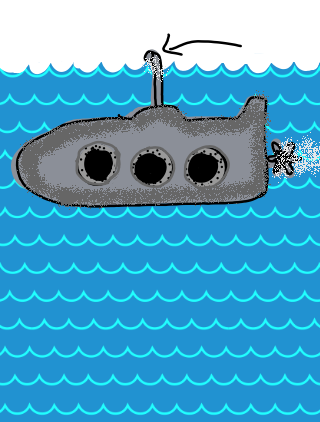Parenting
Submarine Parenting
This may be the perfect median between neglectful and helicopter parenting
Posted March 6, 2016
If I’m not supposed to be a Helicopter Parent, and I’m not a Free Range Parent, then
what am I supposed to be? A Submarine Parent, says Marie Schwartz, CEO of TeenLife. Who is she and what is that, you ask? Well, I had this unusual experience. A few weeks ago, after I posted a piece in the Huffington Post about being neither a helicopter nor a free range parent, someone contacted me through Twitter and said, “you mean like a Submarine Parent?” Next thing I knew, she was suggesting I interview her client for my blog. My first impulse was, “Who, me? I’m not qualified. I’m not a journalist. I’m a humorist.” But then I thought, heck, why not interview this person? She’s got something to say about success and parenting, after all. And I’m going to lean in. Also, what is Submarine Parenting?
So I did. And she was really nice. Very gracious. Her name is Marie Schwartz, and she started her company TeenLife in 2006. She worked full-time outside the home and was looking for summer activities for her teens. They had outgrown their summer camps, but they needed something to do. So she researched all kinds of programs—academic, community services, arts programs—and came up with a list. This list she shared with other parents she knew, and the rest is history. After a couple of years of running this list part-time, she decided to make it her full-time job. Now TeenLife operates in most major cities in the US, and is getting interest from other countries as well. Pretty impressive. The listings are available free for students, parents, and educators. Check it out. www.teenlife.com.
Eventually, I asked her about Submarine Parenting. “Raising kids is like building a boat and then launching it,” she said. So if the kid is the boat, the parents are the submarine: the submarine is there, under the surface. The kid knows it’s there—that is crucial—but the submarine stays out of sight and out of the way unless there’s a distress signal.
This philosophy underlies TeenLife. She thinks that to raise successful kids, parents should provide opportunities for them to experience things that take them “out of their comfort zone.” Ideally, before leaving for college, students should have “at least two weeks” away from home. The goal is to help them prepare emotionally for life when they go away to college and beyond. According to the Jed Report, 60 percent of college students wish they had been better prepared emotionally. That means giving them opportunities where they have to deal with other people’s negative emotions (and their own) and advocate for themselves. Opportunities that help them feel confident that they are competent.
So what do you think, readers? Submarine Parenting? Is that the solution? I like it. I like the term. I discovered that Marie Schwartz didn’t invent it. It seems to belong to Silvana Clark and dates to 2010. Anyway, it’s a Millennial term. I think it is a synonym for "intuitive parenting," another supposed Millennial parenting style.
I like it, although I can see the point my friends make that it has a creepy, lurking feel to it.
I’m all for sending the kids away for at least two weeks. I think it takes at least that long for them to adjust to being away from home for the first time. Both my children have been away. The senior has been away for five weeks every summer since the summer after 6th grade. The 8th grader has been away twice. The first was somewhat disastrous, as she sees it. She went to a rustic camp during a particularly rainy summer, and spent three and a half weeks slogging around mud and using outhouses. I remember cringing when other kids would talk about their summer camps—how they went water-skiing and sailing—and she talked about swimming in the lake and the rain, picking vegetables, and digging trenches.
But even though she now says it was awful, she was so proud of herself when we arrived to pick her up that I felt it was worth it. Since then, she has been away to a less rustic camp, a theater camp, with electricity and plumbing—and she’s going back this summer.
Anyway, since I had a very competent entrepreneur on the horn with me, I pressed her on the subject of successful children and successful parents. Marie Schwartz weighed in to say she feels successful “if I have a kid who’s really passionate and motivated about what they are doing.” What they are doing, she adds, should pay “a living wage.” They should also know how to manage their own money and have good relationships in their lives.
For herself, she defines success as “doing what makes you a better person.” She also thinks success is being a good role model for living with “passion and drive.” Agreed. “If your kids want to hang out with you, you’ve done something right.”
Amen, sister. Time will tell. Right now, I’m not so sure how I'm doing in regard to this definition of success. But I do like a periscope.
© Hope A. Perlman March 2016
This post appears in an extended version on my personal blog, Unmapped Country.
Visit me there!
Follow me on Twitter.



